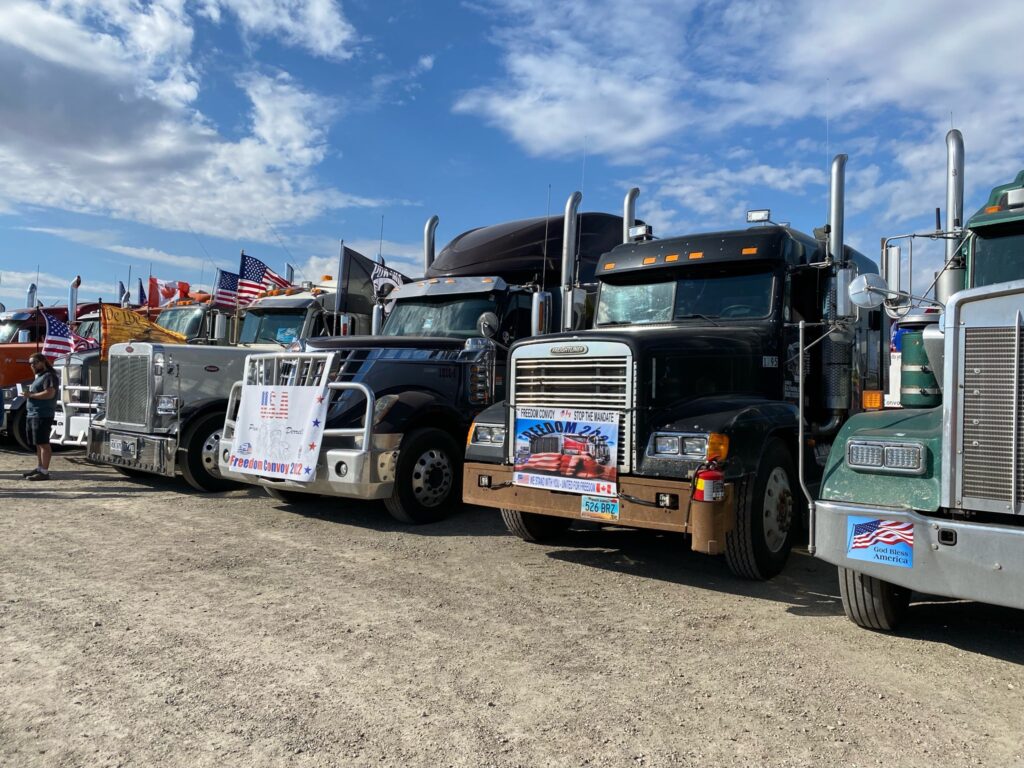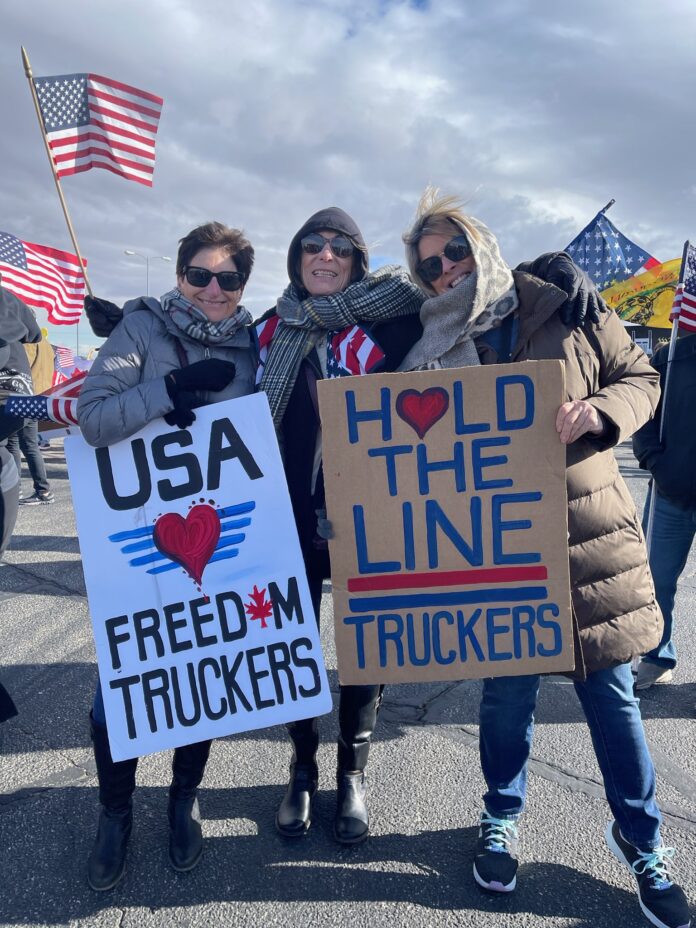Millions of Americans cheered as the People’s Convoy — a coordinated group of 500-600 vehicles — wended its way from Southern California to just outside of Washington, D.C., in recent weeks to demand freedom from unlawful health “mandates.” At the head of the line was Ventura County resident Ray Alexander, a recently retired Navy commander who planned logistics for the major national effort.
“People have told me that God creates people for specific purposes, and I don’t think my skill set could be any better leveraged than by this convoy over the last three or four weeks, both from an advisory role and then from a coordination role out on the road,” Alexander told the Guardian.
Alexander, who retired from the Navy reserves in December rather than comply with unconstitutional COVID shot mandates, joined the Convoy’s core leadership team in February, bringing much-needed logistical experience. Among other things, in the past, he has organized a 350-truck convoy across the Saudi Arabian peninsula for the U.S. military. He employed that same systematic approach to planning each day, which helped the People’s Convoy truckers and drivers proceed smoothly and safely through a dozen states across 2,500 miles.
Plans that would normally require more advanced preparation materialized within hours.
The group’s goal was to tell elected leaders at all levels to immediately discontinue the state of emergency and drop any remaining restrictive health measures. They also encouraged Congress to exercise greater oversight of the executive branch and to analyze the effectiveness of the nation’s COVID response.
“We should expect our government and executive agencies to continually improve on behalf of the American population,” Alexander says. “That’s just a commonsense way to operate any organization, let alone the federal government, which is answerable to, and paid for, by the people.”
Convoy participants, many of whom joined along the way from different states, committed to creating a “one hundred percent peaceful, law-abiding, unified, inclusive protest in support of American freedoms,” Alexander says.
Before hitting the road, the Camarillo resident sought personal advice from Canadian Convoy leader Pat King. The American leaders then made three major decisions: They would inspect everybody’s cargo, they would stay outside of federal jurisdictions, and they would send a planning team ahead to pave the way.
Cue Commander Ray.
With a loose but functional plan that Alexander characterized as “a little bit more amoebic, a little bit less centralized and much less standardized” than military operations, the Convoy launched from Adelanto, California, on Feb. 23, with Alexander driving a day ahead to secure marshaling locations and make local contacts.
“Your fight is moral, spiritual. You’re fighting for the soul of our country.”
Ret. Commander Ray Alexander
He says he felt a strong spiritual sense of purpose throughout the mission. Plans that would normally require more advanced preparation materialized within hours. For instance, when the Convoy neared Indianapolis, it had no sure bed-down location or strategically-placed staging area. With almost no leads, Alexander was seeking solutions when a local man offered his auction space, instantly providing ample space for the Convoy’s needs.
“I’m not one to read into things from a biblical or spiritual sense, or at least I have never really been that way in my life, but the way this path has been laid out before this Convoy, and the fact that these kinds of arrangements could be made essentially the day of with basically cold calls, I mean — how? It’s typically really hard,” he says. “To execute a mission like this, a cross-country convoy of individual truckers and individual civilians — the degree of complexity of this operation should have taken a massive staff, a massive budget and a lot of time to plan in order to avoid critical failure. But we somehow made it all the way across the country without any sort of critical failure. When you think about it from that perspective — and I’ve got a lot of experience in planning convoys — it should have been a lot harder and riskier than it has been.”
It’s easier for him now to “trust in divine intervention,” he says.
Having friendly fellow patriots along the way helped, too. Oklahoma state police were “extremely supportive” and provided a bumper-to-bumper escort from the western border with Texas to Missouri.
“We need to restore the Constitution, and that’s only going to happen by removing the emergency power that state, local and federal officials have been abusing.”
Chris Marston
Also on the leadership team was Topanga attorney Chris Marston, who founded American Foundation for Civil Liberties and Freedom and who attends church in Thousand Oaks. He joined the Convoy and brought with him a team of operational staff.
“It’s truly an honor to support Americans standing up for our freedoms,” Marston told the Guardian during a brief visit home from D.C. “We need to restore the Constitution, and that’s only going to happen by removing the emergency power that state, local and federal officials have been abusing. Because as long as they’re using emergency powers, they’re basically able to get away with ignoring our constitutional rights.”
Partner convoys merged with the main group mid-journey, and together they arrived at their Hagerstown, Maryland, destination. The decision not to enter D.C. itself was a no-brainer, given how the Convoy’s ideological opponents would have tried to portray — or even infiltrate — the effort.
“The obvious way to mitigate that vulnerability was to not go down into the federal district or into federal jurisdiction,” Alexander says. “We believed that would create too much risk and too many vulnerabilities and essentially wouldn’t be worth the risk.”
When the Convoy reached its destination, Alexander tied up loose ends and flew home to his civilian job — but first, he penned a memo to give parting advice to those still leading the Convoy.

“The greater, more dangerous trap is that you become enveloped by the movement, the momentum; that you, and the good people with you, become swept up by the excitement into thinking you’re in control. You’re not, I’m not, the DC Metro Police are not, nor is Biden. God is in control,” the memo read. “I recommend you follow the guidance God gave to Joshua before he conquered Jericho (Joshua 6:1-27): Circle the city once per day, starting today, then seven times on Sunday, blowing your horns all the while. Keep silent, no media, no releases, just drive and keep the faith. On Sunday, after the seventh circle, have a rally, state your demands, give glory to God and go home, leave it in His hands. I give this advice, not because I think you’re Joshua, that DC is Jericho, or because you’re there to conquer a city. None of this is true. You’re not in a physical battle, though the adversary would like to make it physical. Your fight is moral, spiritual. You’re fighting for the soul of our country. Therefore, to follow God’s guidance to Joshua is symbolic of your respect for Him, He whose wisdom and Truth underpin the American system of Government and way of life.”
The Convoy circled the beltway around D.C. and held meetings with Senators Ron Johnson (Wisc.) and Ted Cruz (Texas), and five Republican House Transportation committee members. Marston took part in those meetings.
“The Senate meeting was great, and Senator Cruz and Johnson were wonderful — totally get it, in total agreement,” he says. “Ted Cruz came out to the Convoy, spent time with the truckers, shook hands, really is taking the time to understand what we the people are asking for and what this means to them, and that’s what we need our government to do.”
As for the House Transportation Committee members, Marston calls them “a bunch of spineless weenies that could give a hoot for the American people. They had no interest whatsoever to even help us get a meeting. It was disappointing. They all need to be voted out.”
Back in Camarillo, Alexander is pleased with the massive effort, which drew countless thousands to overpasses and rallies along the way.

